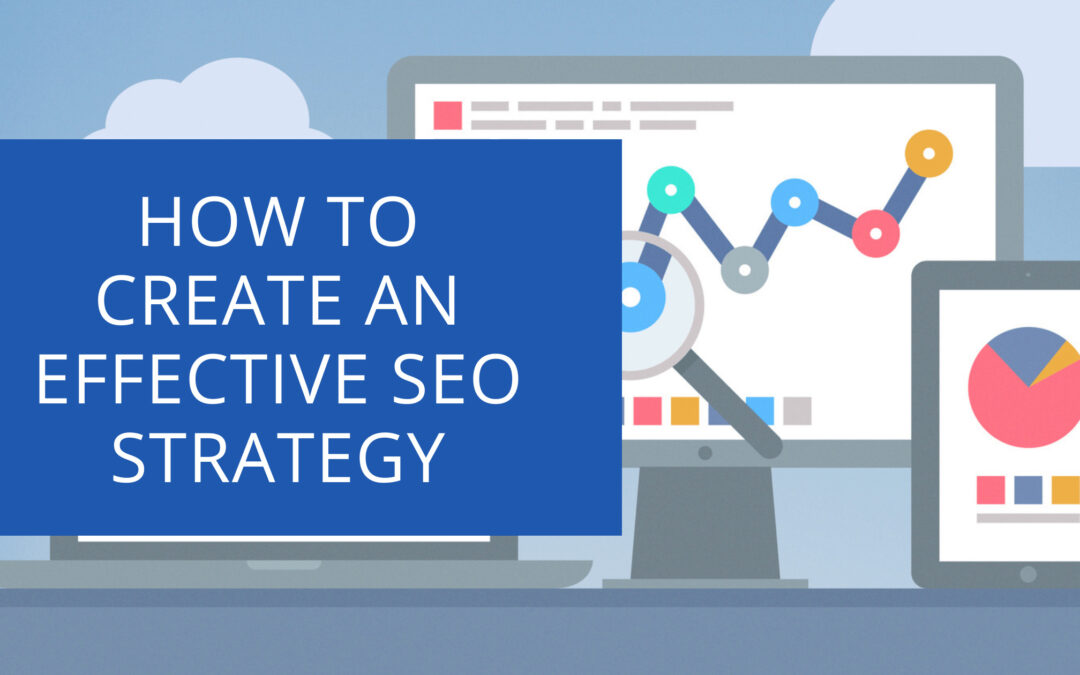Creating an effective SEO strategy can be a daunting task. There are many factors to consider, and it can be hard to know where to start. In this 8-step guide, we will walk you through the process of creating an SEO strategy that will help your business reach its goals.
Whether you are just starting or have been doing SEO for a while, these tips will help you create a plan that works for you. So let’s get started!
Contents
What is an SEO strategy?
An SEO strategy is a plan of action that you put in place to help your website rank higher on search engines. It involves using various techniques, such as keyword research, link building, and content optimisation, to improve your site’s visibility and organic search traffic.
Why is an SEO strategy important?
An SEO strategy is important because it can help you improve your website’s visibility and organic search traffic. When you rank higher on search engines, you can generate more traffic and leads, which can help increase the visibility of your brand. Additionally, a strong SEO strategy can help you achieve long-term growth in your online presence.
8 tips for building an effective SEO strategy
1. Research your target audience and identify keywords they are likely to use
 When you’re building an SEO strategy, the first thing that you need to do is research your target audience and identify keywords they are likely to use when they perform a search.
When you’re building an SEO strategy, the first thing that you need to do is research your target audience and identify keywords they are likely to use when they perform a search.
You can find these by using keyword research tools like Ahrefs Keywords Explorer, SEMrush’s Organic Research Tool, or even Google’s own AdWords Keyword Planner tool. These will help you figure out what your customers are searching for about your website. In turn, this enables you to understand their language, needs, and interests better so that you can create content that addresses them appropriately.
2. Carry out analysis of your competitor’s SEO strategies
Once you have identified your target keywords, it’s important to determine how well the top ranking sites in Google are using those same words. You can do this by carrying out a competitive keyword analysis of each one.
The most effective way to carry out competitive SEO strategy analysis is by using Ahrefs’ Keywords Explorer tool. It gives you an overview of all the pages that rank for any given search term and shows their domain rating (DR). The higher a site’s DR score, the more likely it will rank highly on Google.
Include the number of referring domains to their sites, their domain rating, their top-performing pages in terms of links and traffic, and how much content they have indexed. This will give you an idea of where to head with your strategy to beat them.
3. Audit your website’s performance and identify areas that need improvement
Once you have done a competitive analysis of your top-ranking competitors, it’s time to carry out an audit of your site.
By completing an audit, you can see the areas that need improvement for you to achieve better rankings. The main four areas in an SEO audit are technical, content, link profile, and competitor analysis. Let’s have a quick overview of the topics in these four areas:
Technical Analysis
- Site structure and navigation
- Crawl errors
- 301 Redirect Review
- Page Speeds
- Internal Links
- Check for canonicals
- robots.txt file analysis
- Logfile analysis
- Schema
- Site maps
- Page Speed
- Mobile-friendliness
- Broken links and 404 pages
Content Analysis
- On-page Optimisation
- Keywords targetted
- Topical Authority
- Image Optimisation
- Content Quality
- Formatting
- Keyword cannibalisation issues
- Social media integration
Link Profile Analysis
- Link evaluation
- Anchor text analysis
Competitor Analysis
- Content evaluation
- Link profile analysis
- Gap analysis
Please see our guide to performing an audit on your website that includes tips for carrying each of the above areas.
4. Fix technical SEO issues
 After you have carried out an SEO audit of your website, it’s time to fix any issues that were identified during the process. Having a technically sound website can have a positive effect on your rankings and sets the foundation for the next stages of the strategy.
After you have carried out an SEO audit of your website, it’s time to fix any issues that were identified during the process. Having a technically sound website can have a positive effect on your rankings and sets the foundation for the next stages of the strategy.
5. Write high-quality content
One of the most important aspects of SEO is to produce high-quality content that will engage your target audience. This type of content can help you rank higher in search engine results pages (SERPs), as well as attract more links and social media shares.
6. Optimise your website
- On-page Optimisation: Once you have created your high-quality content, it’s important to optimise it for the search engines. This can be done by using the correct keyword density, titles, meta descriptions, and headings.
- Mobile Friendliness: With an increasing number of people using their mobile devices to search for information online, your website must be optimised for these devices. This can be done by ensuring that your website is responsive and provides a good user experience on all types of screens.
- Page speeds: Google has made it clear that page loading time is going to be a ranking factor. Make sure your website loads quickly by reducing the size of images, optimising code, and using CDNs (content delivery networks).
- Schema markup: Schema markup can help provide more information to search engines and therefore improve your rankings.
- Target featured snippets: A featured snippet is a box that appears at the top of the search engine results pages (SERPs) and contains a summary of the answer to the user’s query. You can improve your chances of appearing in this box by using structured data on your website.
- Internal links: Internal links are links from one page on your website to another. By including internal links, you can help improve the rankings of the pages you link to as it allows “link juice” to be spread throughout your website.
7. Develop a link building campaign
Link building is an important factor in every SEO strategy. Links from authoritative websites can be very beneficial for your rankings, as well as improve the reputation of your website online. Link building strategies include:
- Guest posting on authoritative sites and blogs
- Broken backlink building
- Building citations
- Building relevant directory listings
Please see our link-building guide for in-depth information on building high-quality backlinks.
8. Track your progress and results
 While your SEO strategy is in place, it’s important to monitor the results that you are getting and identify areas where improvement can be made. This will allow you to track how effective each of the steps above has been and adjust them accordingly if need be. The following metrics should be tracked:
While your SEO strategy is in place, it’s important to monitor the results that you are getting and identify areas where improvement can be made. This will allow you to track how effective each of the steps above has been and adjust them accordingly if need be. The following metrics should be tracked:
- Organic rankings: Tracking your website’s organic rankings can help you measure the success of your SEO strategy. You can use dedicated rank tracking tools such as SerpFox to track this information or the ahrefs Site Explorer.
- Web site traffic: Web site traffic can help you identify which SEO tactics are working best for your business. You can Google Analytics to track this data.
- Inbound links: Inbound links from other websites can be used as a measure of the success of your link-building campaign. You can use Google Search Console, ahrefs, and SEMrush to track your new incoming links.
- Clicks and impressions from search: The number of clicks and impressions your website receives from search engines can help you identify which keywords are most effective. You can use the Google Search Console “Search Traffic” report to track this information.
- Conversions: If you have a goal conversion, such as signing up for a newsletter or making a purchase, tracking this information can help measure the success of your SEO strategy. You can use Google Analytics to track this data.
- Leads: If you are generating leads from your website, tracking this information can help identify which SEO tactics are producing the most results. You can use Google Analytics to track this data.
SEO Strategy FAQ
What is SEO?
SEO, or search engine optimisation, is the process of improving the visibility and ranking of your website in search engine results pages (SERPs). SEO can be achieved through a variety of techniques, including optimizing your website content, structure, and on-page elements like titles, metatags, and anchor text; building high-quality backlinks to your site from other websites; and optimizing your website for local search.
How much does SEO cost?
SEO can be expensive, but it’s worth the investment. The cost of SEO services can vary depending on a number of factors, including the size and complexity of your website and the level of competition for your keywords. Generally, you can expect to pay anywhere from £299 to £5,000+ per month for SEO services.
What does an SEO company do?
An SEO company will work with you to develop an effective SEO strategy that aligns with your business goals and objectives. They will help you improve your website’s visibility and ranking in search engine results pages, as well as track and report on the performance of your SEO campaigns so you can see how they are contributing to your bottom line.
How do I choose an SEO company?
When choosing an SEO company, it’s important to consider their experience, industry expertise, and overall approach to SEO. It’s also important to ask for references and case studies from previous clients so you can see the results they’ve achieved for other businesses.
Why do I need SEO?
If you want your website to be found by potential customers online, you need SEO. Without it, your website will likely never appear in SERPs for the keywords that matter most to your business. Even if you have a great website with great content, without SEO it’s unlikely to generate traffic and leads.
How long does SEO take to see results?
SEO is a long-term strategy that typically takes at least several months to see results. The length of time it takes to achieve desired results depends on several factors, including the competitiveness of your keywords and the complexity of your website. However, with a well-executed SEO strategy, you can expect to see significant improvements in traffic and leads after 3 to 6 months.
What are the benefits of SEO?
The benefits of SEO include increased website traffic, leads, and sales; improved brand visibility and awareness; and higher ROI. In addition, effective SEO can help to improve your website’s organic search ranking, which can lead to more qualified leads and better conversion rates.
We Offer SEO Services Nationwide
- Chester:https://mediakynect.co.uk/seo-chester/
- Wirral: https://mediakynect.co.uk/seo-wirral/
- Liverpool: https://mediakynect.co.uk/seo-liverpool/
- North Wales: https://mediakynect.co.uk/seo-north-wales/
- Wrexham: https://mediakynect.co.uk/seo-wrexham/
Conclusion
This is it! You have now finished reading the complete guide to creating an effective SEO marketing strategy. The next step is for you to put your new knowledge into practice and create a real-world action plan that will help improve your website’s organic rankings!

